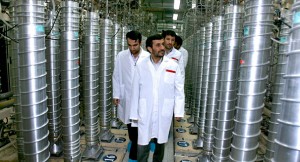 Major powers are ready to make “a substantial and serious offer” to Iran during talks next week in return for concessions on its nuclear program, a Western diplomat said on Wednesday.
Major powers are ready to make “a substantial and serious offer” to Iran during talks next week in return for concessions on its nuclear program, a Western diplomat said on Wednesday.
He declined to give details of the offer – aimed at reviving efforts to reach a diplomatic solution to long-stalled talks over Iran’s disputed nuclear work.
“We will take an offer with us which we believe to be a substantial and serious offer,” the diplomat said of talks in Almaty, Kazakhstan. “This is an offer which we think has significant new elements in it.”
The West has imposed heavy economic sanctions on Iran to persuade it to abandon those parts of its program the powers suspect are intended to give it nuclear weapons capability.
Iran denies seeking nuclear weapons, saying its nuclear program is for peaceful, civilian purposes only.
“Diplomats are committed to finding a diplomatic solution, but the government of Iran really has to show that it’s doing what it says it’s doing,” the diplomat said, on condition of anonymity.
The five permanent members of the Security Council along with Germany – the so-called P5+1 – will hold talks with Iran in Almaty on February 26.
Western officials in Washington have told Reuters they plan to offer to ease sanctions barring trade in gold and other precious metals in return for Iran shutting its Fordow uranium enrichment plant – a proposal already rejected by Tehran.
The Western diplomat declined to comment on that, nor to say in what way the offer to be made in Almaty would differ.
Another Western diplomat said hopes for the meeting were not “sky high” but the talks were being viewed as an opportunity to engage with Iran. “It’s an open and positive offer and we hope that they will respond,” he said.
“We’ve always offered quite a bit. The original offer in 2008 was a very generous offer, very comprehensive and that is still basically there on the table and what we’re offering now is more precision about certain elements of that,” he added.
The 2008 offer both acknowledged Iran’s right to a civilian nuclear program and recognized its need for broader security guarantees against attack.
SANCTIONS SEEN BITING
Western diplomats argue that sanctions are taking their toll on Iran’s economy and hoping as a result the new diplomatic push could succeed where past attempts have failed.
The negotiations held by the P5+1 also follow a renewed offer by the United States to hold direct talks with Iran if it showed it was serious about reining in its nuclear program.
Any broader political dialogue between the United States and Iran would be aimed at reducing mistrust dating back to the 1979 Iranian revolution and seizure of the U.S. embassy in Tehran. Such a dialogue would be a means of giving additional momentum to existing negotiations on Tehran’s nuclear program.
Iran has given little indication of what it would bring to the table in Almaty.
It rejected the offer of an easing of sanctions on gold trade as unacceptable and its ability to make significant concessions is seen as limited before Iranian presidential elections in June.
It has, however, resumed work to convert small amounts of higher-grade enriched uranium into fuel, a move which would slow its accumulation of stockpiles that could, if enriched further, be used for weapons.
Diplomats say it has also held off from putting into operational additional centrifuges at Fordow where it enriches uranium to 20 percent – a level that can be rapidly turned into weapons-grade material.
The International Atomic Energy Agency is expected to issue shortly its latest report on Iran, which will indicate the size of its stockpiles of enriched uranium and detail other developments in its nuclear program.
Reuters

Leave a Reply
You must be logged in to post a comment.